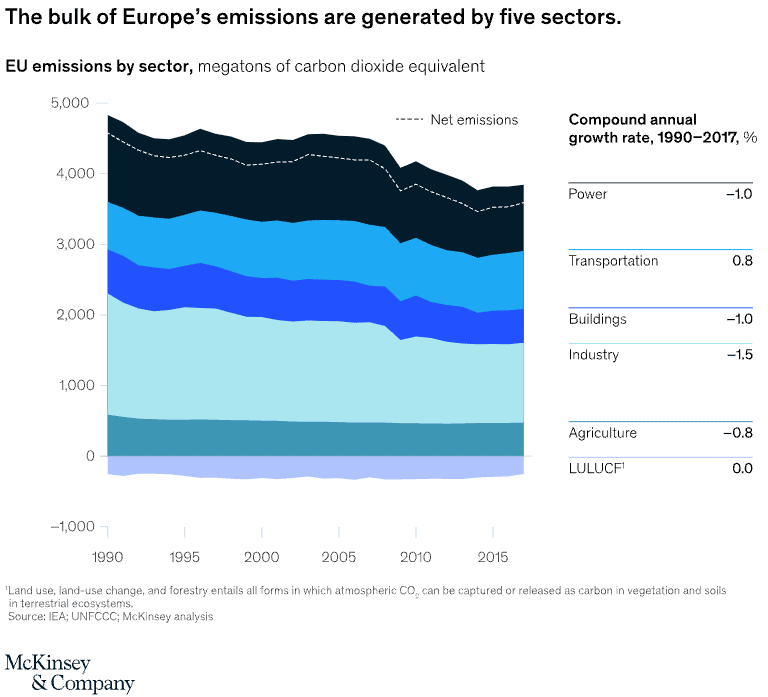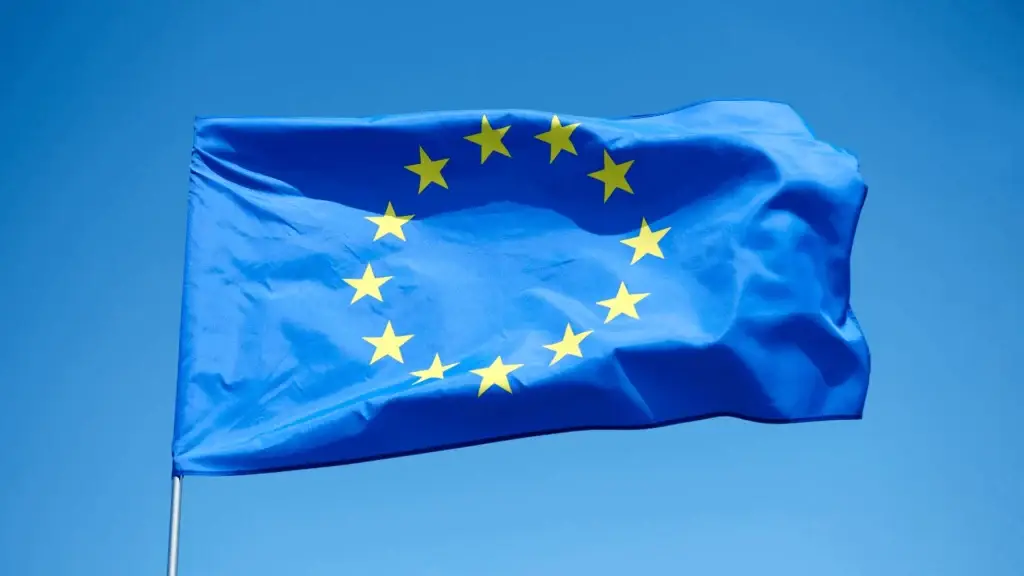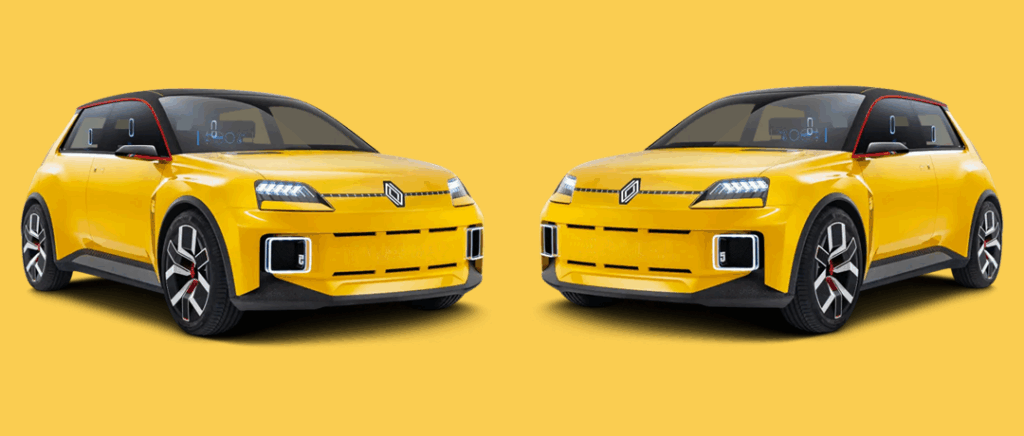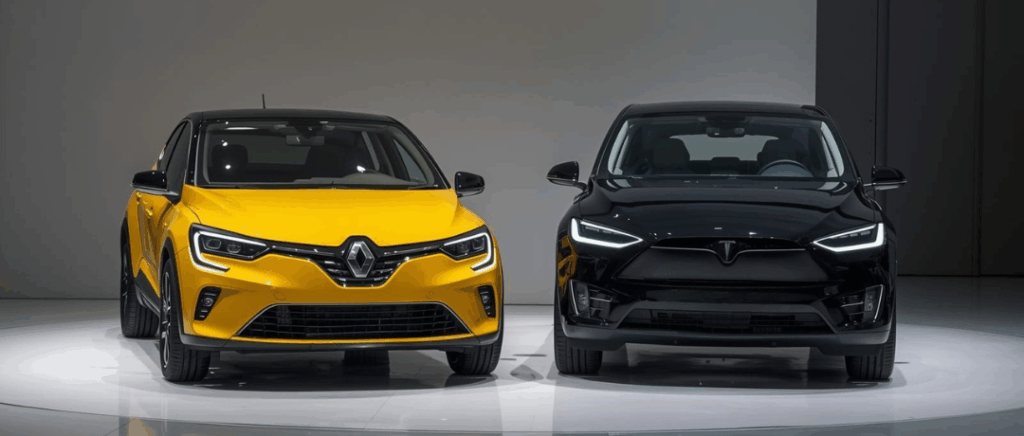Monday to Friday 9am - 12.30pm - 2pm - 7pm
What does "Net Zero" mean and why is it important for Europe?
The concept of Net Zero (Zero net emissions)was designed to tackle the exponential environmental problems linked to CO2 emissions released into our atmosphere. The underlying idea is as follows: since it is almost impossible to completely eliminate emissions from virtually every stage of production and transport in our economy, Europe will strive both to reduce its emissions and to reduce its greenhouse gas emissions. Europe will strive both to reduce these emissions and to implement a CO2 capture strategy that allows us to reach a point of equilibrium, where greenhouse gases in the atmosphere do not increase over time. In other words, the expression "net zero emissions" means the overall balance between greenhouse gas emissions produced and greenhouse gas emissions removed from the atmosphere.
EU aims to be climate neutral by 2050In other words, an economy with zero net greenhouse gas emissions. This objective is at the heart of the European Green Deal and in line with the EU's commitment to global climate action under the the Paris Agreementsigned in 2015 by 192 countries plus the European Union.
The transition to a climate-neutral company can be seen as an urgent challenge, but also as a great opportunity to create a better future for all of us and for future generations.
But how is the European Union going to take action to achieve such ambitious targets? And how can you, as an individual or business, have an impact on all this?
To find out more: Green Deal: a turning point for electric cars.
Net zero: what action does it involve?
The plan consists of defining certain objectives for specific years in the future, in order to create a gradual but constant reduction in greenhouse gas emissions. In fact, the EU plans to reduce emissions by 55 % by 2030 (compared with 1990 levels) and to reach net zero by 2050. It is also important to mention that decarbonising Europe can have wide-ranging economic benefits, including job creation, GDP (gross domestic product), growth and a reduction in the cost of living.
All economic sectors can and must contribute to the fight against climate change. reducing greenhouse gas emissions. For example, industry must continue to modernise and evolve in order to pollute less, and at present the best option seems to be a move towards a more electric society. The aviation and marine sectors, which are among the fastest-growing sources of greenhouse gas emissions, need to become more energy efficient and implement the use of alternative, greener fuels.
To reduce emissions from energy-intensive industries, the EU has set up an emissions trading scheme. The EU ETS (Emissions Trading Scheme) is a carbon permit market that sets the amount of emissions that power plants, industrial facilities and airlines can release into the atmosphere. Permit levels are progressively reduced to cut emissions from participating industries.
Where do we need to reduce emissions?
Five major sectors emit the majority of the European Union's greenhouse gases:
- 28 % come from transport
- 26 % Industry
- 23 % electricity
- 13 % buildings
- 13 % Agriculture
It was noted that, in all sectors, the fossil fuel combustion is the main source of greenhouse gases (GHGs), representing 80 % of emissions. This identifies the crucial element that needs to be worked on and got rid of as quickly as possible: the fossil fuels.

Why is it important to get rid of fossil fuels?
It is now essential to understand how to act in each sector of activity in order to reduce the quantity of greenhouse gases emittedwhile maintaining the same level of production and service delivery and being able to sustain constant growth and innovation in the market. European continent. The possibility of finding an alternative to fossil fuels and implement it in our society could be the solution to many of the environmental problems we face today, and could also create a more sustainable, efficient and equitable economy.
How will the EU plan to achieve Net Zero?
The EU can support and implement the transition by investing in realistic technological solutions, empowering citizens and harmonising actions in key areas such as industrial policy, financing and research, while ensuring social equity for a just transition.
Based on this principle, the EU has defined a different strategy to achieve this objective:
Power: transition and the crucial role it plays
Given that wind and solar generation technologies are already available and can be developed in the private and public sector, electricity would probably be the fastest sector to decarbonise. It is important to bear in mind that demand for electricity would double as other sectors switch to green electricity and hydrogen, requiring rapid scaling up and improvement of renewable generation and storage capacity. Being more 'centralised' than other sectors, it is also easier for states and governments to implement an effective electricity generation strategy. The year 2040 is considered to be the possible year for achieving carbon neutrality for electricity generation..
What does the future hold for transport?
This sector is crucial for the "Net Zero" objectiveThis is because it is the industry that has the greatest impact on greenhouse gas emissions, with more than 50% of the world's greenhouse gas emissions. 28 % of total emissions. The electric vehicles are widely seen as the best option for solving the problem. Indeed, once the majority of vehicles are electric, emissions will fall rapidly. Although the solution seems easier than in the electricity sector, it will take around 10 years to create the appropriate supply chain for vehicles and charging stations. This sector will reach the goal of carbon neutrality by 2045 about.
Buildings: how is the housing sector changing?
Most of the technologies needed to decarbonising the building sector are already available. However, the renovation work throughout the European Union is massive and could take much longer than in other sectors. The main changes to be implemented are the use of 100 % of renewable energies for domestic needs, the reducing gas use by at least 60 % and the installation of better thermal insulation to consume less energy. The building sector should reach net zero by the end of the 2040s.
What about the industrial sector?
This is the most complex and costly sector to decarbonise. Indeed, industry would need certain technologies that are still under development. As the production of goods and materials of all kinds is fundamental to our society and economy, it is very complex to reach a sustainable point for each industrial sector.
In addition, the distinctive nature of the industry makes the situation even more complex and difficult to improve. As a result, it has been estimated that it will reach net zero by 2050. Even at this stage, industry will still produce large quantities of greenhouse gases, but hopefully in a more controlled and manageable way than today.
Agriculture: what role does food production play?
More efficient farming practices could reduce agricultural emissions. But it is by far the most difficult sector to reduce, as more than half of agricultural emissions come from raising animals for food and cannot be reduced without significant changes in meat consumption or technological breakthroughs. As with industry, our cost-optimal pathway requires offsetting emissions from agriculture with negative emissions from other sectors and increasing carbon sinks. natural carbon. Different and interesting solutions have been developed in recent years, but scaling them up will require a joint effort that is almost impossible to predict. What is certain is that red meat consumption is set to decline over the next decade, with a growing trend towards white meat and plant-based alternatives.
In terms of CO2 absorption, there are also 2 other main options implemented by the EU:
Land use, land-use change and forestry (LULUCF)
Land use, land-use change and forestry make it possible to account for the flows of CO2 between the various terrestrial reservoirs (biomass, soils, etc.) and the atmosphere that take place on the managed surfaces of an area. It can therefore be a net source or sink of CO2.
Carbon capture and sequestration technologies
Also known as CSCis defined as the carbon dioxide (CO2) capture and storage process before it is released into the atmosphere. This technology can capture up to 90 % of CO2 released by the combustion of fossil fuels to produce electricity. electricity generation and industrial processes.
The impact of zero-emission policies on electric vehicles
As we explained earlier, the transport sector will play a crucial role in the production of objectives of the zero-emissions programme. The transition to a green society based on electricity will be one of the EU's main objectives over the next few decades, and it is vital to understand the importance of EVs (electric vehicles) in the society of the future.
With 6.5 million electric cars sold by 2021It is clear that the process of electrification of the transport sector is accelerating and that it is only a matter of time before the majority of passenger vehicles are electric. This has various implications for the electric vehicle sector, for example:
- the reduction in the price of electric cars over time, thanks to the development of more efficient and cheaper technologies, the expansion of the supply chain and the phenomenon of economies of scale.
- increase in the number of recharging points in European cities, which will make owning an EV (electric vehicle) easier and more convenient.
- the possibility of battery crisis in the near future, when demand will outstrip supply for raw materials and production.
- the reduction of premiums and incentives granted to EU citizens for thepurchase of an electric vehiclebecause of their expansion and generalisation. Check which bonuses are available to you at the moment.
- a ban on the sale of new internal combustion engines in the very near future (2035 for the EU as a wholebut even earlier for some Member States).
- rising petrol and diesel prices and an inverse reduction in electricity costs.
The impact on consumers
When a large-scale, high-impact transformation such as the energy transition and the creation of a more sustainable society is implemented, it is clear that each individual will be affected in different ways and to different degrees. Let's look at a few examples of what could change in consumers' lives in the future:
- the increase in the price of gas, diesel and petrol derivatives will have an impact on our wallets.
- the widespread use of electricity generation and consumption will make electrical products and services more practical.
- the introduction of incentives for electric vehiclesprivate renewable energies and housing efficiency will give you the opportunity to make savings.
- By improving air quality and generally reducing pollution, Net Zero actions will obviously improve people's general quality of life.
- new opportunities and new workplaces will be created and offered in the future.
For companies
A change in our economic models is crucial if we are to achieve the goals we have set ourselves. Net Zero objectives in time. This is why businesses will play an important role in this transformation and will probably be guided more by governments and international organisations to create a change that will have an impact on the whole planet. What is most likely to happen in the future?
- the electrification of various industries will make it more practical to switch to electric technologies.
- The ban on internal combustion engines will make electric fleets more practical for businesses.
- The general trend towards sustainability and the electricity transition will make your business more attractive to the customers concerned if you opt for greener solutions.
- Sustainability is also synonymous with efficiency, which could enable companies to make significant savings in terms of resources and money.
In conclusion
By pursuing decarbonisation, the EU could effectively become energy independent. Between 2020 and 2050, demand for oil, gas and coal would fall by 80 %.
Although the European Union is no longer dependent on imports of fossil fuels, it could develop new dependencies on imports of technologies essential to a zero-emissions economy. Today, for example solar panels are mainly imported into the EU, and certain essential raw materials, such as cobalt for batteries or iridium for electrolysers, have a limited supplier base.
The transition to zero-emission technologies could also influence competitive dynamics and shift production locations. Adapting to change could threaten certain parts of the EU economy, while creating new opportunities.
This development will create enormous opportunities for citizens and businesses, but it could also generate stress and problems for those who do not adapt in time. Given the increase in demand and the possible future shortage of certain raw materials and elements crucial to the production of electrical goods, acting in advance could be a wise decision and make our lives much simpler in the years ahead.
































